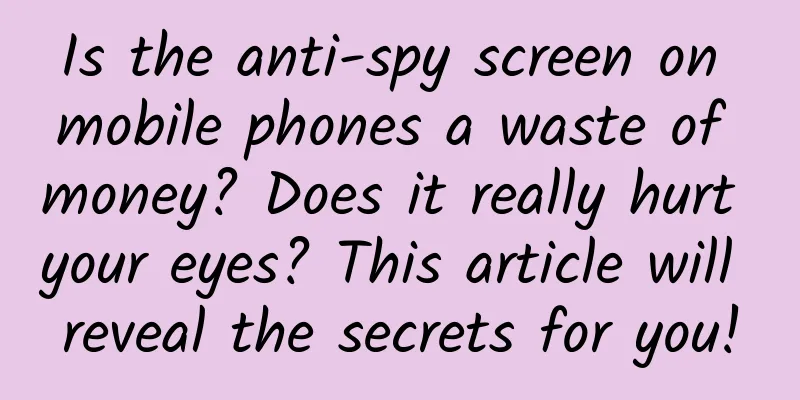Is the anti-spy screen on mobile phones a waste of money? Does it really hurt your eyes? This article will reveal the secrets for you!

|
In the digital age, mobile phones have become an indispensable part of daily life. However, many people choose to put anti-peep films on their phones to protect their privacy, thinking that they can browse without worrying about being peeped at. Many people also think that anti-peeping films are a waste of money and may even cause damage to the eyes! So, does the anti-peeping screen really hurt the eyes? What is the anti-peeping principle behind it? Huaihua Aier Eye Hospital will explain it to you~ 1. The principle of mobile phone anti-peep screen The principle of mobile phone privacy screen is based on ultra-fine blinds optical technology. This technology reduces the structure of blinds by tens of thousands times to form a fine grating structure. The "small fences" in these grating structures play a role in blocking light. When light is incident vertically on the anti-peep film, it can pass through unimpeded; as the angle of incidence of light increases, the light is gradually blocked by these shutter structures, and the amount of light that passes through decreases accordingly. Therefore, only the user facing the screen can receive enough light to see the screen clearly, while the bystanders at a certain angle to the screen receive weaker light and appear to be completely dark, thus achieving an anti-peeping effect. 2. Does the privacy screen really hurt your eyes? 1. Increase visual fatigue The special optical design of the privacy film may cause uneven light distribution on the screen, the screen brightness may decrease slightly, and the viewing angle of the screen will become narrower, which may make users feel uncomfortable when viewing the screen at certain angles, or they may need to adjust the screen brightness to adapt. A screen that is too bright can irritate the eyes and easily lead to problems such as visual fatigue and dry eyes. A darker screen will make the eyes work harder to see the content clearly, increasing the burden on the eyes and may also cause visual fatigue. 2. Color distortion The color saturation and clarity of the mobile phone screen have decreased, especially when watching high-definition videos or pictures. 3. Light reflection and glare In direct sunlight or strong indoor light, the privacy film may increase screen reflection and glare. 3. What should we pay attention to when protecting our eyes? 1. Eye environment Make sure the light in your environment is adequate and soft, and avoid irritation to your eyes caused by strong or weak light. When using your phone, adjust the screen brightness according to the ambient light. 2. Balanced nutrition Make sure you get enough vitamins and minerals, especially vitamins A, C and E, and Omega-3 fatty acids, and eat more fresh fruits and vegetables, such as carrots, spinach and deep-sea fish. 3. Outdoor activities Primary and secondary school students should spend at least 2 hours outdoors every day; preschool children should spend at least 3 hours outdoors every day; adults should also go outside more often to relieve eye fatigue. Source: Huaihua Aier Eye Hospital Follow @湖南医聊 to get more health science information! (Edited by YT) |
<<: Danger! A woman had frequent headaches, and it turned out to be a "ticking time bomb" aneurysm!
Recommend
What to do if you have a severe cough at 38 weeks of pregnancy
Many people know that the late pregnancy is also ...
How to treat acne on a girl's face
In daily life, due to various reasons such as fre...
What you don't know about neonatal external ear deformity, it is recommended to deal with it in this way
Photo: Li Jingyu Zhejiang Provincial People's...
How to comfort a girl during her menstrual period
The menstrual period is a very special period for...
Girls shave their hair down there
We will find that many foreigners shave their pub...
Plateau physical examination: protect health, prevention first
Author: Yu Feifei, attending physician of the Chi...
What terrible changes will happen to your body if you smoke one cigarette a day?
When a cigarette is lit, it produces more than 7,...
What are the side effects of taking birth control pills for the first time?
Many people always forget to stop using contracep...
Three months pregnant, fetal movement on the left
Fetal movement is a way for expectant mothers to ...
What causes endometrial thickening after menopause?
Menstruation is an important factor affecting wom...
Can I drink milk if I have ovarian cyst?
In our lives, many people like to drink milk beca...
What causes brown discharge between periods?
As female friends, menstruation is one of the phy...
Is chest pain due to pregnancy or menstruation?
Every woman will experience different symptoms be...
Ten common misunderstandings about vaginitis that you may not know
Content from : Gu Zhuowei Shanghai Renji Hospital...
What to do with parenchymal inflammation?
Many people do not know what vesicular inflammati...









